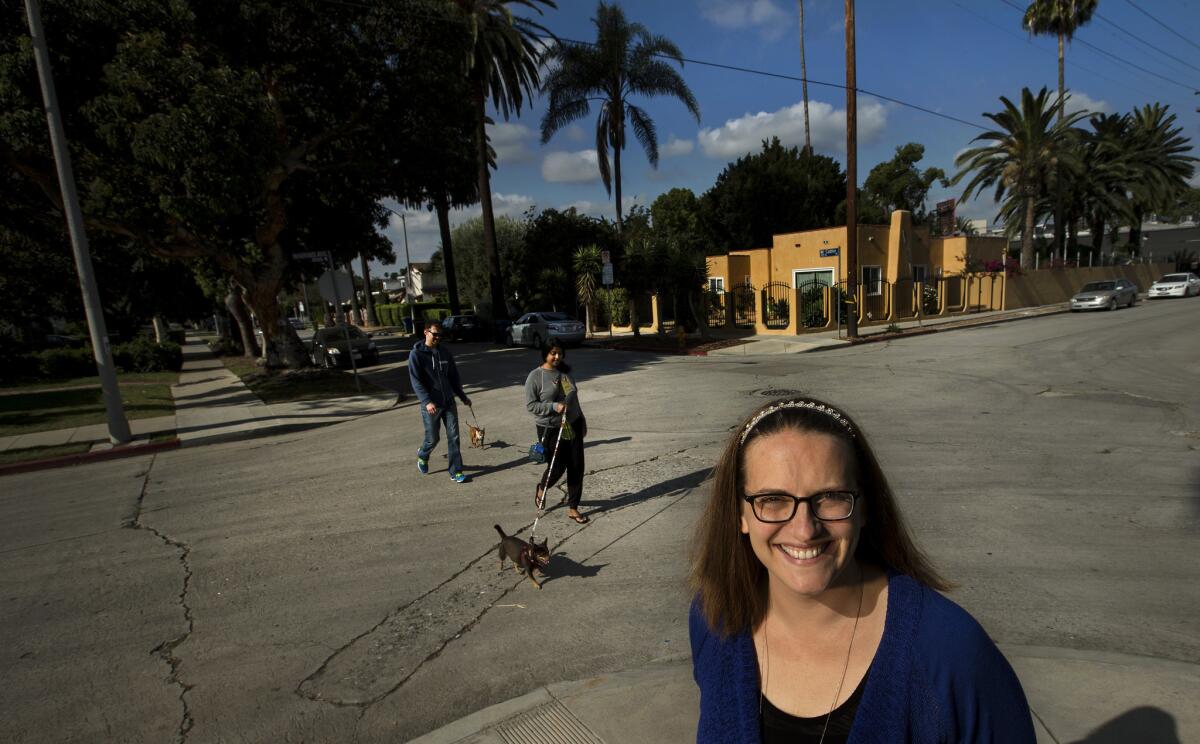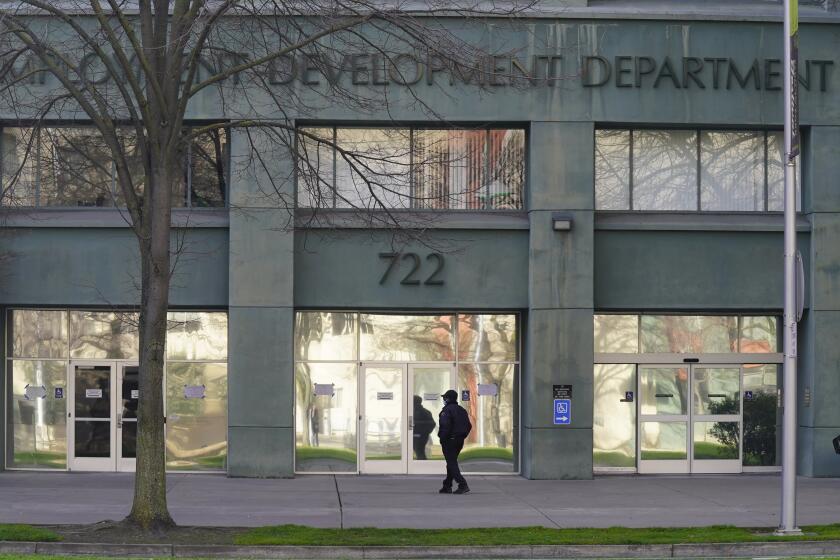Column: ‘Did you call 911?’ Here’s how one man reached out to his rescuers

No names were exchanged that day in Hollywood.
The woman who came to the aid of a man in distress did not know him, nor did she know the other two women who offered support. When paramedics arrived and raced the man to the hospital, the street was cleared and the women returned to their routines not knowing if the man would live to see another day.
A few weeks later, a sign was posted to a tree at the intersection where the drama had played out.
“Did you call 911 last March 17?” it said. “You saved my life. Please call me.”
The sign included a name, Leon, and a phone number. A colleague alerted me to the sign and I called several times. No answer.
Then one day Leon picked up. He is 71, a retired judge who preferred that I not use his last name.
He told me the story, or at least what he knew of it.
He was taking his car in for servicing that day, a day like any other, when he got hammered by a sudden, massive heart attack. He did not recall any warning signs, didn’t know where it had happened or how he stopped his car. It was all a blank.
He learned from Los Angeles Fire Department records that someone had called 911 from the intersection of McCadden Place and Waring Avenue, not far from where he lives, and had begun CPR. So after five days in the hospital and more time in outpatient recovery, Leon drove to the intersection, posted his sign and began knocking on doors. He was grateful he hadn’t hurt anybody and was determined to give thanks.
“The second time I went, two women came out of the corner house,” Leon says.
Their names were Samantha and Ashley, and Leon asked if they knew anything about the March 17 incident.
“And Samantha says, ‘Oh my God, you’re the man.’ ”
Samantha and Ashley, a couple, told Leon they heard noise and went outside to find him flat on his back in the street. A woman knelt over him, taking instructions from a 911 dispatcher.
“He was totally out of it and turning purple and dying,” Samantha recalls.
Ashley, a CPR-trained psychotherapist, had a shoulder injury and couldn’t do CPR. But she knelt and encouraged the woman to begin chest compressions.
Other people had gathered and some of them questioned that treatment, perhaps thinking Leon had been hit by a car and might have cracked ribs or broken other bones.
Ashley helped the woman stay focused on a steady rhythm of quick, strong thrusts, hands splayed against Leon’s chest. A bit of his normal color returned.
He was totally out of it and turning purple and dying.
— Samantha
Minutes later, the paramedics wheeled Leon away. The woman who had performed CPR was ready to resume her commute to work.
“I stopped her and asked how she was,” says Ashley. “She slowed herself down enough to connect and have a moment of pause. She started to cry, so we sat down on the curb.”
A few minutes later, she was gone. No names were exchanged.
As he processed his brush with death, Leon’s senses were sharpened. A feeling of warmth washed gently over him. The spring weather was heavenly. The play of light on buildings was magical.
He was alive.
“Someone saw me and intervened, and I was so touched,” he says. “This is supposed to be an anonymous metropolis, where nobody connects.”
A friend of Leon’s told me he has been devoted to social causes for decades, serving as a guardian angel to many. Now he needed to find his own guardian angel.
And then a breakthrough: Leon managed to dig up the record of the phone number on the 911 call that day.
He dialed; a woman answered.
“He started with, ‘I don’t even know your name,’” says the woman. “He asked if I was the one who called 911 on March 17. I said yes and he said, ‘I’m the man. You saved my life.’”
Her name is Susie Powell. The former English teacher and aspiring screenwriter lives on the east side of Hollywood and drives to her Beverly Hills job as a legal assistant.
On that day, in a city of 4 million people, she was on secondary streets to avoid heavy traffic, and so was Leon. They arrived almost simultaneously at McCadden and Waring.
Susie has a habit of pausing to make eye contact with other drivers at the intersection. She wants to make sure they know they have a stop sign and she does not.
Imagine that, says Leon. That it was Susie rather than someone less observant or caring. That she paused. That she noticed. That she got involved.
“I couldn’t make eye contact because he was slumped over in his seat,” says Susie. “And I realized I should check this out.”
She parked and knocked on Leon’s window. No response. She dialed 911.
Can you open his door? Yes, Susie said.
Can you wake him up? No.
Get him out of the car and flat on his back, the dispatcher advised.
When Susie began pulling, Leon’s foot came off the brake and the car started rolling.
Susie walked alongside the moving car trying to wrestle Leon free, and finally she did. The car continued slowly forward before nudging a parked vehicle.
Susie knew CPR from her teaching days, but she was nervous, especially with the distraction of people telling her to leave the man alone.
“At first I wasn’t doing it hard enough and Ashley was like, ‘He’s turning blue, you have to do it harder,’ and I put my whole body into it. There were people shouting at me and saying I was stupid and don’t touch him, to the point where I second-guessed myself.”
Susie says the dispatcher told her to keep going.
“Ashley was the same way. She said, ‘Don’t listen to any of that,’ and she was counting really loud. One-two-three-four-five.”
Everyone did their job that day. The 911 dispatcher, the paramedics from LAFD Station 27, the doctors at Cedars-Sinai, the strangers who briefly came together and are no longer strangers.
Leon has visited Ashley Domask and Samantha Geballe a few times. He has sent cards and delivered flowers. He asked what he could do in thanks; they told him that wasn’t necessary. In the end, he donated to their favorite charity -- an animal rescue center.
Leon finally met Susie Powell last weekend. She recognized him as he approached her at a lunch spot in Los Feliz.
“We hugged,” says Susie, who found Leon to be quite healthy looking for a man who was unconscious at their last encounter. “And gracious and lovely.”
“There was a certain immediate intimacy,” Leon says.
Susie, who never noticed Leon’s sign in the weeks after coming to his aid, says she thinks most people would have done the same thing she did that day. When Leon asked what he could do in thanks, she said he didn’t need to do anything.
As they got to know each other over lunch, Leon told Susie about his many interests. He mentioned his support of Xela-Aid, a nonprofit that delivers desperately needed services and resources to an impoverished Guatemalan city.
Once again, their lives intersected.
“In college, I did a study-abroad tour in Central America,” says Susie. Her language school was in Xela.
Leon had an idea. He sponsors a child’s education in Xela, he told Susie. What would she think about him sponsoring a second child, in her name?
“As soon as he said it, I thought, ‘Oh, that’s lovely,’” says Susie, who taught English in San Diego.
Leon plans to host a gathering of all the people who came together on the morning of March 17 to help keep him alive.
Connections have been forged. Names have been exchanged.
ALSO
Chinese kids who climb 2,500-foot ladder may get stairs
Trump meets with farmers and declares the state’s water problem ‘so insane’
In historic visit to Hiroshima, Obama calls on the world to morally evolve
More to Read
Sign up for Essential California
The most important California stories and recommendations in your inbox every morning.
You may occasionally receive promotional content from the Los Angeles Times.











